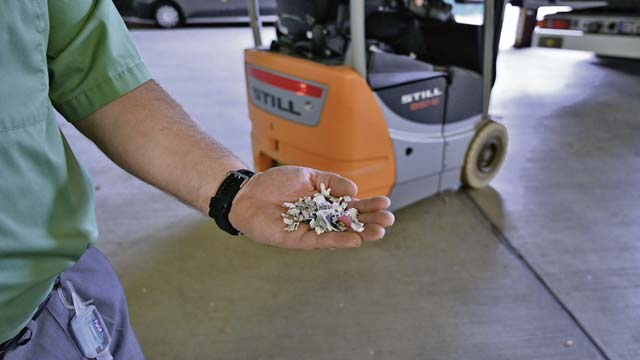
Garrison employees at Panzer Kaserne, reached a major milestone Aug. 15 when the last of nearly 19,200 boxes of expired records were loaded onto the truck for destruction – at relatively no cost to the government.
The load hauled out of the Records Holding Area weighed more than 15 tons, or about the weight of 12 small cars and was removed and disposed of securely by a contracted shredding service. The removal was part of an Army-wide push to digitize paperwork and lower the need for garrison record holding areas.
The team worked for four weeks sorting and loading 20 truckloads worth of paper files. The shredded records will eventually turn into … toilet paper. Yes, toilet paper.
The records’ chance at an afterlife not only saved the garrison money, but also contributed to the “Ready Garrison” efforts on becoming a greener garrison.
“We originally had this as a cost project,” said Dr. Richard Calnon, director of human resources. “We were going to pay someone to destroy it and they shifted over to a zero-cost contract through contracting because of the expressive interest in having the resources. The resources being the paper.”
The garrison’s Chief of Administration Services Brian Raymond oversees the Record Holding Area.

Raymond ensured skeptics that the old adage of “you get what you pay for” doesn’t apply here. He said the secure shredding service used exceeds the Army’s standard for the documents that often contain social security numbers, birthdates, banking information, and other personally identifiable information.
Additionally, the documents are shredded along with the company’s current workload. That means an archived Army Civilian’s living quarters allowance application or a Soldier’s paper leave request from 2002 could be shredded alongside a mortgage paper application from a commercial bank in Frankfurt.
The company then sells the shreds to a mill that produces toilet paper and paper towels.
To add an extra layer of security, Raymond said member of the records team followed the truck to its shredding destination to ensure the records not only arrived at the shredding facility securely but were also destroyed within hours of arrival.
“We are protecting the records until they don’t exist,” said Calnon.
Despite a heavy weight – 583,122 pounds to be exact – being lifted off the Records Holding Area, that doesn’t mean the area is closing just yet. Raymond said there still are records that must be kept. By law, certain records must be retained for decades, or in some cases, forever. The Army will keep those records locally until they are eligible to be moved to a federal holding area such as the National Archive and Records Administration in College Park, Maryland.
Despite the contracted heavy load of work, the team didn’t escape time in front of the shredder. Paper that isn’t cutout to be toilet paper, such as X-rays from the early 2000s, must be destroyed by the in-house shredder.
“There’s still work to be done,” Raymond said. “But now we get to be ahead of the game. This frees up manpower, and manpower is money.”


